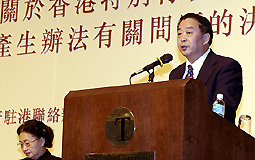
|
| Actual situation: Qiao Xiaoyang tells a forum: "If you hold up the banner of universal suffrage which symbolises democracy, it doesn't take much courage. Those who are bold enough to look at the long-term interests of Hong Kong and say that there shouldn't be universal suffrage in 2007/2008 are those who have the well-being of Hong Kong in mind." |
While universal suffrage in Hong Kong is the Central government's ultimate aim, it is not achievable in 2007 or 2008, nor will it solve all Hong Kong's problems a top Mainland lawmaker says.
Deputy Secretary-General of the Standing Committee of the National People's Congress Qiao Xiaoyang and other Mainland officials visited Hong Kong today to participate in two forums aimed at explaining their reasons for endorsing the Chief Executive's report on Constitutional Development.
Speaking at the first forum at the International Trade & Exhibition Centre in Kowloon Bay, Mr Qiao stressed that the committee had taken widespread views into account. To those who say most Hong Kong people want universal suffrage in 2007 and 2008, he countered: "Any responsible government in taking a significant decision would not and should not listen only to the opinions reflected in opinion surveys. It would have to consider the community's genuine long-term interests and general aspirations.
"A government led by the nose by opinion polls would not be good enough," he added. "If you ask any member of the community, would you like to have a universal suffrage for choosing the Chief Executive, I don't think anyone would say no. But universal suffrage is not a free lunch, everyone has to pay a price for it."
Universal suffrage will not bring an answer to all the problems that we are facing, he noted.
Balanced participation, business, key to capitalism
"Hong Kong is a highly internationalised capitalist city. Under the Basic Law, Hong Kong should not exercise socialism or socialist policies. The original capitalist lifestyle should be kept unchanged for 50 years. According to Marxism, an important characteristic is that means of production should be owned by private individuals. There should be low taxation, highly efficient administration, pluralism and rule of law.
"To maintain the current capitalist system, we must make sure Hong Kong's political system takes into account various sectors' interests including labour. There must be balanced participation."
He stressed: "Without the business sector, there would not be capitalism in Hong Kong."
Universal suffrage is not achievable in 2007 and 2008, Mr Qiao said, noting that 'gradual and orderly progress' is intertwined with the actual situation. "Some say there should be a timetable, but it is impossible for us to lay down a timetable in advance. Nobody can foretell after how many years the conditions would be there."
Level of democracy at all-time high
Mr Qiao reminded the audience that the level of democracy in Hong Kong has never been as high as now. As in the past, he noted, the Central Government would be promoting the development of democracy continuously. "This is an effort on the part of China to maintain peace and prosperity in Hong Kong."
Since the handover, "everything China has done for Hong Kong is for the good of Hong Kong and the Hong Kong people. The Central Government has no self-motive."
He told the audience, comprised of Hong Kong National People's Congress deputies and local Chinese People's Political Consultative Conference National Committee members, "If you hold up the banner of universal suffrage which symbolises democracy, it doesn't take much courage. Those who are bold enough to look at the long-term interests of Hong Kong and say that there shouldn't be universal suffrage in 2007/2008 are those who have the well-being of Hong Kong in mind."
Society has not fully respected Basic Law
Six years after Hong Kong's reunification with the Mainland, many people still do not have an understanding of the Basic Law and the 'one country, two systems' policy, Mr Qiao said. "The nationalistic spirit and understanding of Hong Kong's legal status and people's understanding of the concept of universal suffrage is not clear."
Under such circumstances, if we make radical changes to Hong Kong's electoral systems, how can we make sure that there will not be any adverse impact on the country's sovereignty as well as HK's overall interests? he asked.
"The Basic Law is a constitutional document, and this legal status has not been reinforced adequately in Hong Kong. The Basic Law is supported widely by Hong Kong people, but over the past six years almost every day it has been challenged, questioned, distorted or even condemned," he said.
"To put it more strongly, when this constitutional piece of law has not been fully respected in society, any radical changes to the political system will bring about a negative impact."
Ongoing disputes over reform don't help economic recovery
Hong Kong's constitutional development must be in line with its economic development, Mr Qiao reiterated.
"Hong Kong is now in the midst of economic recovery and it is difficult for us to absorb further shock. Our investment climate should not be further dampened," he said.
"Aggressive action and never-ending disputes may be a sign of a free society, but it will not be able to address the rice bowl issue."
|